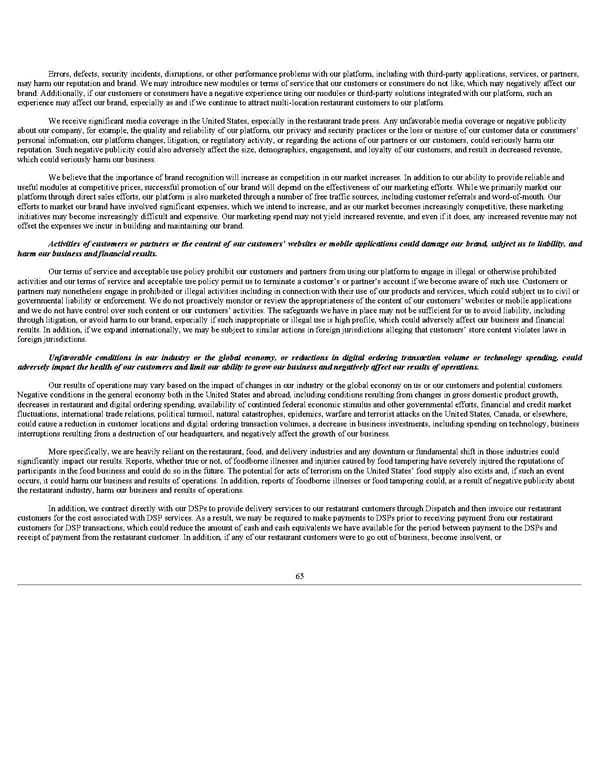Errors, defects, security incidents, disruptions, or other performance problems with our platform, including with third-party applications, services, or partners, may harm our reputation and brand. We may introduce new modules or terms of service that our customers or consumers do not like, which may negatively affect our brand. Additionally, if our customers or consumers have a negative experience using our modules or third-party solutions integrated with our platform, such an experience may affect our brand, especially as and if we continue to attract multi-location restaurant customers to our platform. We receive significant media coverage in the United States, especially in the restaurant trade press. Any unfavorable media coverage or negative publicity about our company, for example, the quality and reliability of our platform, our privacy and security practices or the loss or misuse of our customer data or consumers’ personal information, our platform changes, litigation, or regulatory activity, or regarding the actions of our partners or our customers, could seriously harm our reputation. Such negative publicity could also adversely affect the size, demographics, engagement, and loyalty of our customers, and result in decreased revenue, which could seriously harm our business. We believe that the importance of brand recognition will increase as competition in our market increases. In addition to our ability to provide reliable and useful modules at competitive prices, successful promotion of our brand will depend on the effectiveness of our marketing efforts. While we primarily market our platform through direct sales efforts, our platform is also marketed through a number of free traffic sources, including customer referrals and word-of-mouth. Our efforts to market our brand have involved significant expenses, which we intend to increase, and as our market becomes increasingly competitive, these marketing initiatives may become increasingly difficult and expensive. Our marketing spend may not yield increased revenue, and even if it does, any increased revenue may not offset the expenses we incur in building and maintaining our brand. Activities of customers or partners or the content of our customers’ websites or mobile applications could damage our brand, subject us to liability, and harm our business and financial results. Our terms of service and acceptable use policy prohibit our customers and partners from using our platform to engage in illegal or otherwise prohibited activities and our terms of service and acceptable use policy permit us to terminate a customer’s or partner’s account if we become aware of such use. Customers or partners may nonetheless engage in prohibited or illegal activities including in connection with their use of our products and services, which could subject us to civil or governmental liability or enforcement. We do not proactively monitor or review the appropriateness of the content of our customers’ websites or mobile applications and we do not have control over such content or our customers’ activities. The safeguards we have in place may not be sufficient for us to avoid liability, including through litigation, or avoid harm to our brand, especially if such inappropriate or illegal use is high profile, which could adversely affect our business and financial results. In addition, if we expand internationally, we may be subject to similar actions in foreign jurisdictions alleging that customers’ store content violates laws in foreign jurisdictions. Unfavorable conditions in our industry or the global economy, or reductions in digital ordering transaction volume or technology spending, could adversely impact the health of our customers and limit our ability to grow our business and negatively affect our results of operations. Our results of operations may vary based on the impact of changes in our industry or the global economy on us or our customers and potential customers. Negative conditions in the general economy both in the United States and abroad, including conditions resulting from changes in gross domestic product growth, decreases in restaurant and digital ordering spending, availability of continued federal economic stimulus and other governmental efforts, financial and credit market fluctuations, international trade relations, political turmoil, natural catastrophes, epidemics, warfare and terrorist attacks on the United States, Canada, or elsewhere, could cause a reduction in customer locations and digital ordering transaction volumes, a decrease in business investments, including spending on technology, business interruptions resulting from a destruction of our headquarters, and negatively affect the growth of our business. More specifically, we are heavily reliant on the restaurant, food, and delivery industries and any downturn or fundamental shift in those industries could significantly impact our results. Reports, whether true or not, of foodborne illnesses and injuries caused by food tampering have severely injured the reputations of participants in the food business and could do so in the future. The potential for acts of terrorism on the United States’ food supply also exists and, if such an event occurs, it could harm our business and results of operations. In addition, reports of foodborne illnesses or food tampering could, as a result of negative publicity about the restaurant industry, harm our business and results of operations. In addition, we contract directly with our DSPs to provide delivery services to our restaurant customers through Dispatch and then invoice our restaurant customers for the cost associated with DSP services. As a result, we may be required to make payments to DSPs prior to receiving payment from our restaurant customers for DSP transactions, which could reduce the amount of cash and cash equivalents we have available for the period between payment to the DSPs and receipt of payment from the restaurant customer. In addition, if any of our restaurant customers were to go out of business, become insolvent, or 65
 Q3 2021 10Q Page 70 Page 72
Q3 2021 10Q Page 70 Page 72